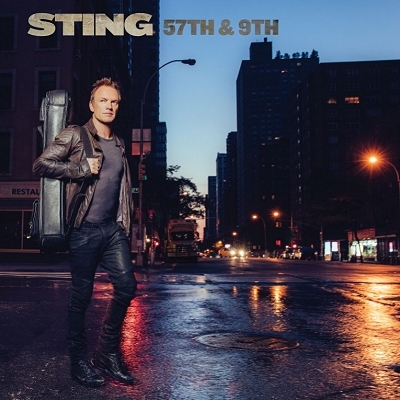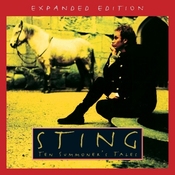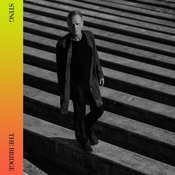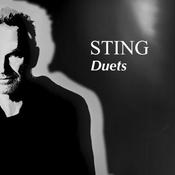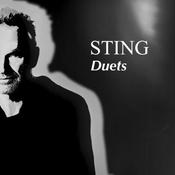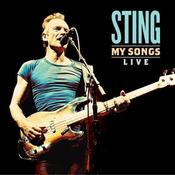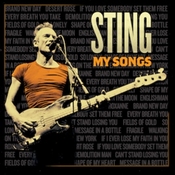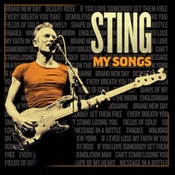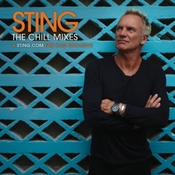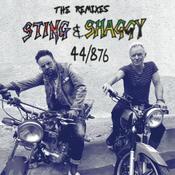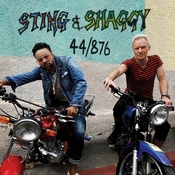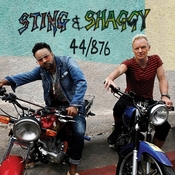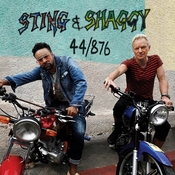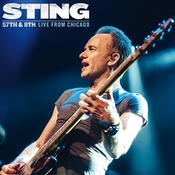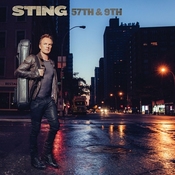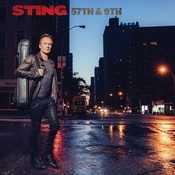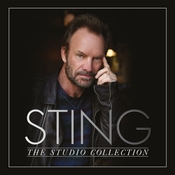57th & 9th
Soundbites
"'Inshallah' is a beautiful word from the Arabic language which is kind of resignation - it's God's will, it shall be - or it's a word that describes some sort of hope, courage. I don't know what the political solution is but I think if there is a solution, it has to be rooted in empathy - for the victims of the war that's going on in Syria at the moment for example, the victims of poverty in Africa, and perhaps in the future the victims of global warming."
'AFP', 11/2016
"The first song on the new record is called "I Can't Stop Thinking About You." It sounds romantic at first. But the song is actually about creativity, specifically: about writing. Like an artist or author has a blank slate in front of them every day. It's like snow: There are no clues as to what lies beneath. Is there a road or simply a path? Is there an animal or a muse? And if it is a muse, is it a romantic or a spiritual muse? We don't know. We writers face this problem every day. Yet we indulge the obsession of wanting to express ourselves with words."
Sting, Stuttgarter-Nachrichten, 01/2017
“The songs are not about New York. I call them ‘ten short stories’. They deal with various issues, some of them more serious, some not so. It’s a tribute to New York without me singing directly over New York.” Everyone knows, “I’m an ‘Englishman In New York”!
Sting, Deutsche Grammophon, 2016
“For the last ten years, my music has been a bit esoteric so people will think I’m doing something like that again. But I want to surprise you. And I’m always happy when I see happy faces who hear rock’n’roll. This record is very direct, simple and the songs are rather short. My old DNA from times with The Police can be seen in it – provided with a new feeling.”
Sting, Deutsche Grammophon, 2016
"An intrinsic part of a musician’s life is to create the wow factor, which comes down to the instruments as well as what your songs say. For example, in recent years, I have made records that had a more esoteric touch simply for the fact that a theme caught my attention and I was curious to learn new things. Perhaps people assume that I will continue doing the same, which they may or may not like. But I was clear that with this album I wanted to do something new and surprise people with something different. I wanted the public to hear something from me that they were not anticipating. Certainly, I could have also surprised them with an electronic music record. This album was something spontaneous, recorded very quickly and done with friends. Every day, I went to the studio in New York where I met with my guys and we would work. When I got back home I would try to give more shape to what we had done, find a story and turn it into song. For me, the experience was to enjoy myself."
Metro, 9/2016
"The first song called "I Can’t Stop Thinking About You" is a song about obsession. It’s really about a writer who sits in front of a blank sheet that looks like a snowy field. Your job as a writer is to write something and dig to find something – a muse, an idea and something to inspire you. The dilemma for any writer is to find inspiration. Music for me flows much faster and I get it in a more natural way, but the inspiration to write the lyrics of the song comes from a much more mysterious place that I really do not understand, but I know if I have patience and discipline it will come. In a way, I want to find myself in a somewhat uncomfortable situation because my life, as you can imagine, is very privileged. Where I live in New York, I have a terrace and during winter when it is freezing cold, below zero degrees, I lock myself out with my paper, my pen and my music and do not enter the house until the song is finished. It is a way of inspiring me and forcing myself to write. I did this for many days. I was terribly cold and so my first song refers to that."
Metro, 9/2016
"If we consider the surprise factor, the most different one is “Petrolhead” because it is very rock and roll. I think it will surprise people. On the other hand there is another one that I think is very sensitive which is “Heading South on the Great North Road,” which is a bit where I come from and why I went in search of a better life. In this sense it is related to another song called “Inshallah” that relatively speaking is also about people – refugees – seeking a better life. I think all people in some way are refugees. Not at the level of the people of Syria, obviously, because they are in imminent danger, but in the sense that no matter where you live, your ancestors always come from elsewhere. We must bear this in mind. The flow of refugees may change in the future; perhaps we will have to seek refuge and hope that others will accept us and will not put obstacles in our way. I'm not trying to give it any kind of political solution, but it is something that must be treated gently and not as something abstract that does not affect us. We have to think of a face, a family and not just in numbers. I have no answer but we have to solve it because it will not go away. The reasons for migration are now mainly due to war and poverty, but soon climate change will also affect it so it is important to get to work and together try to fix it."
Metro, 9/2016
"The thrust of it is rock’n’roll, but all my [musical] DNA is in there. There’s some folk music, some thoughtful, quiet moments. My whole thing is surprise. If I’ve been making esoteric albums for the past 10 years, then people expect that I’ll do that again. But the main thing was, 'Hey, let’s have some energy’. It’s not a lute album."
Daily Telegraph, 11/2016
"Glenn Frey, Lemmy, David [Bowie], Prince, Alan Rickman. We had dinner with him a few weeks before. Alan invited Trudie and I specifically to say goodbye to us, but without saying goodbye. His wife told us later - he came to New York and had dinner every night with his close friends. We called him on New Year’s Day - we heard he was in a hospice. He said, 'Oh, I’m fine, I just had a blood change.’ He was dead two weeks later. When a generation’s cultural icons die, it shocks us. The childlike part of us believes they’re immortal. And when you’re a man of a certain age and you’ve lived most of your life already, you think, 'Wow, this is real.’?"
Daily Telegraph, 11/2016
"I got my musicians in the studio in Hell’s Kitchen in New York and said, ‘I have no idea what we’re doing. Let’s play musical ping pong.’ I needed to make decisions very hard and fast and very quickly and stick by those decisions. But it gave the record a character that it wouldn’t have otherwise had."
London Free Press, 11/2016
"For the last decade or so, I’ve been making what you might call esoteric records where I was only following my curiosity. There was no commercial agenda. Then I thought, ‘What should I surprise people with now?’ And it came to me, a rock ’n’ roll record, or at least the thrust of it being rock ’n’ roll. That could get people saying, ‘Wow, I didn’t expect that.’ And that’s what the reaction has been. I think it’s already successful in that regard. People can recognize my entire music DNA on this record – from the beginning until now. It’s all me. I’m a gadfly. I want to do as many different things as I can. Some people have one furrow and they dig deep and I respect them for that, but I like to mulch around."
London Free Press, 11/2016
"There was no overriding concept to this album. In fact it was made without any pre-planning at all. I went into the studio with literally no ideas of what it would be except that it would take a short amount of time... Every day, I took something home with me on the walk back to my house. I would ask the song to tell me a story and the next day I’d turn up with a song. Day by day this grew. But there’s no overarching theme or concept."
London Free Press, 11/2016
"I normally go in the studio with a great deal of preparation. This time, I just booked the studio and brought my cohorts who have worked with me for almost three decades: Dominic Miller on guitar, Vinnie Colaiuta on drums. And I said, “Guys, let’s just play musical Ping-Pong.” An idea will go around in a circle, and a song will materialize, or at least the semblance of a song. I then structure it, give it a shape, and then take that shape home and ask that song what it’s telling me. Who is the character singing this? What’s the mood, what’s the narrative? And then I’d play a trick on myself. I’d lock myself out of my apartment, on the terrace in the cold, and not come in until I’d finished a lyric. I had a cup of coffee and a coat. It was one of those things to put myself out of my comfort zone in order to trick the muse into playing ball with me."
New York Times, 11/2016
"Although it’s about a rock star, and of course I’ve been a rock star, “50,000” is not really me. It’s a character that seems to be singing through me and looking back on his career and, in reflection, finding philosophy. There are a lot of people like me at my age, still making rock ’n’ roll, having that rather singular experience of being in front of all those people and feeling empowered, and the hubris of that. And the psychological danger of it, too. And then coming out the other side and asking: “What did that mean? Are you, in fact, a god? Are you godlike?” No, you’re not. You’re very very human, and very mortal. It’s hard to express how unique that feeling is. Not many of us have stood up on those stages in front of 50,000; 100,000; a quarter of a million; in my case, half a million people out there. That can be a very heady and confusing experience. You need a certain perspective on it, to say, “This is fun, but it’s an illusion.” If you do that, then you’ll survive it. Otherwise, no, you’ll become the victim of it."
New York Times, 11/2016
"I set out to complete the whole thing in three months at the most. I hadn't prepared anything. I simply went into the studio with my musicians and said, 'Let's play.' What emerged were ten musical short stories that have a very powerful quality. One part of the album is very rock 'n' roll and energetic. The other part is more contemplative and quiet. The album is a bit like me. I'm both."
Sting, Deutschlandfunk, 12/2016
"I have a pool of musicians I enjoy working with. There are so many different tones on this record. That's why I need diverse musicians. They're my friends. They know how I work and what I need from them. They trust me enough to go into the studio with me without any preparation. And there we play a kind of musical ping-pong. I throw something to them. They throw it back. They know how to respond to what I do. And the music grows richer with each exchange. It becomes more complicated and interesting. We improvise, even though we don't play jazz. We trust, love, and respect each other. The music is a result of this relationship. We're a team—like in football."
Sting, Deutschlandfunk, 12/2016
"I Can't Stop Thinking About You" has different layers. You can understand the piece as a passionate love song. But it's also about the process of songwriting, the passionate search for inspiration. As a composer, I'm confronted every morning with a blank sheet of paper. Completely empty. Like a field covered in snow. And I have no idea where the thing I'm looking for is, or what it is. A story? A character? A path? A romantic muse? A spiritual muse?"
Sting, Deutschlandfunk, 12/2016
"The daily commute to the studio also helped. While I was running, I thought about my ideas. Running stimulates my creativity. It's like a very rhythmic meditation. Running through New York is also very stimulating because it's a very dramatic city. The architecture. The people. The traffic. The noise. I stopped at the traffic light at the same intersection of 57th Street and 9th Ave every day. You have to pay close attention there, otherwise you'll get run over by taxis. While I waited, I gave myself over to my thoughts."
Sting, Deutschlandfunk, 12/2016
"Jim Foley was working as a photojournalist in Syria and was captured by ISIS. He was held captive for many months. Then they murdered him and broadcast the beheading online. I saw a film about him. All his friends said he was the one who kept them all sane. He was the one who got them extra food and blankets. He was the one the guards tortured. And in the end, he was the one whose throat was slit. Luckily, they didn't show the execution in the film. When you watch the film, you fall in love with this extraordinary man. I had his family's words in my head — how much they all missed him. I imagined that the family always had an empty chair at the table for him - as if he could walk in at any moment. This became the song Empty Chair. Later, I found out that his friends at their local bar actually always kept a chair free for Jim."
Sting, Deutschlandfunk, 12/2016
"One Fine Day is my ironic response to the global warming crisis. I pray every day that the climate sceptics who claim climate change is a hoax are right. And that all the scientific evidence for it turns out to be false. They're paid by the coal industry and the oil companies. The English poet William Blake said something great: 'A man who persists in his folly will become wise.' If the fool pushes his folly to the extreme, he will become wise. I hope it won't be too late by then."
Sting, Deutschlandfunk, 12/2016
"In 'Petrol Head,' I play a truck driver. He's a macho guy who only thinks about sex and religion. That's not me, of course. Apart from the religion. It's a funny song. In the middle, I quote William Blake from the hymn Jerusalem: 'Bring me my chariot of fire. Bring me my chariot of fire.' It's pretty raw. I enjoy singing it. I'm slipping into the role of someone else who has nothing to do with me. I don't drive a truck. Okay, I did it once, but that was a long time ago. Maybe it's a secret part of me after all. I enjoy this role, anyway."
Sting, Deutschlandfunk, 12/2016
"I'm convinced that if you structure music correctly, it tells you a story. It then has a narrative thread, an abstract narrative thread. And my job is just to figure out what the music is trying to say. In the case of Petrol Head it was clear that it was about driving. At some point, it became clear: Here's someone driving a huge truck through the American desert. That's the story. I don't really understand it. It's very strange how songs sometimes come to you. You absorb them. They're in the air."
Sting, Deutschlandfunk, 12/2016
"Down, Down Down is about the end of a relationship. Luckily, it's not my relationship. But I have enough life experience to write about it. My heart has been broken. I've left someone. I've broken other people's hearts. I've had all these experiences and can revisit the corresponding emotions at any time. I don't have to relive them. I don't want to. It's also a song about depression, where you sink into the abyss. It's a terrible illness that I don't suffer from. But I know enough people affected by it to write something sensible about it."
Sting, Deutschlandfunk, 12/2016
Backgrounder
Review from All About Jazz by Nenad Georgievski
Throughout his long and illustrious career, Sting has enjoyed an enviable set of circumstances. Not only does he have total artistic freedom but he has been accompanied by elite musicians and has a devoted, global fan base. In return, that has yielded many artistic triumphs as he explored almost every genre known to man. He has been eclectic in his choice of inspiration which is filtered through an ever expansive musical worldview. That incorporates all kinds of sounds and music from pop and jazz to classical, medieval and world music. His new album 57th &9th reveals a restless and uncompromising creative spirit that makes music that still pulses with life and vigour.
Musically, 57th &9th is predominantly painted with the primal colours of rock music: rollicking drums, fizzing guitars and fluid bass lines. The first several songs roar straight out of the box. It's been a while since he sounded this energized and unfettered. Producer (and Sting's manager) Martin Kierszenbaum's sparse and raw production is a welcome change of pace for Sting whose previous work often slipped into the quiet, hushed and comfortable. The energy is tough and lean and he has never sounded this raw, urgent, and edgy since his early days with his band The Police. Sonically, this record does not break any drastically new sonic frontiers for him but these kinds of fast-paced rockier songs have been heard only occasionally on his records with "After the Rain Has Fallen" from Brand New Day (A&M, 1999) "All This Time" Soul Cages, ( A&M, 1991) as examples. The music is driven by a working band of many years and also welcomes other guests to make this recording special. While they rock and sound urgent they don't just bash it away. A band of this calibre is capable of stirring up wild grooves, but here they respond sensitively to Sting's vocal lines, dynamics and conjuring varying dynamics within the songs.
Most importantly, 57th & 9th is dominated by outstanding songwriting. It is another masterclass in the potential potency of lyrics, melodies, and performance from an enduring songwriting master. At heart, Sting is an unequivocally a soul singer and musician. He always sings with great conviction, always drawing you in the story, like having a conversation with an old friend of yours. In contrast to his previous output, the autobiographical and reflective The Last Ship, (A&M, 2013) Sting is utterly engaged in the present, dealing with subjects such as social injustice and the horrors of refugees ("Inshallah"), pondering about climate change and environmental issues ("One Fine Day") or contemplating the passing of colleagues and close friends such as singers David Bowie, Prince or actor Alan Rickman ("50.000") .
The quality of each song is consistently good with peaks and valleys in between. "If You Can't Love Me" is one of the many finest moments here. It is a tender mid-tempo ballad offered with the no-nonsense conviction that reveals love may be beyond the measurement of the rational. It's a love song that is achingly sincere without being invasive. The album closes, gorgeously, with a hushed ballad "Empty Chair" that deals with the subject of a loss. It's a song written for Jim: The James Foley Story, a documentary about a US journalist that was publicly executed by terrorists in Syria. The tone of the song is delicate and graceful. Sting's voice barely raises throughout, yet he manages to convey more emotion than ever before.
Review from Rolling Stone by Jon Dolan
Sting Makes a Surprise Return to Rock & Roll - A darkly impassioned LP full of loud guitars, politics and visions of mortality...
It’s been ages since Sting even seemed to conceive of himself as a rock artist, which is why his straight-ahead new LP is so surprising: 57th & 9th is a no-lute zone. You’d have to go all the way back to “Born in the 50’s,” from the very first Police album, to hear him sing over guitars as rough as the ones on the lonely-horn-dog anthem “I Can’t Stop Thinking About You” or the no-frills driving banger “Petrol Head.” The highlight “50,000” offers a clue to this newfound urgency; over guitarist Dominic Miller’s dark chords, Sting pays tribute to Prince, recalling ecstatic stadium shows, then flashes to a bathroom-mirror vision of his own mortality: “These lines of stress, one bloodshot eye/The unhealthy pallor of a troubled ghost.” Desperation also comes through on “One Fine Day,” a delicate plea for climate sanity, and the Middle East-tinged refugee’s prayer “Inshallah.” Elsewhere, he offers a kind of travelogue through his own musical past, from the Chaucer-y balladry of “Heading South on the Great North Road” to “If You Can’t Love Me,” a mordantly Kafkaesque echo of the jazz rock Sting made in the Eighties. Even if the album gets more ponderous as his concerns deepen, it’s nice to see the king of pain flex a little.
Review from Los Angeles Times by Mikael Wood
On '57th & 9th,' Sting urgently shares what's on his mind...
In 2013, Sting sat for an hour or so interview in a small dressing room at what was then Jay Leno’s “Tonight Show.”
The veteran English musician was in town talking up “The Last Ship,” an album of songs from a musical he’d composed that was headed to Broadway, and in the course of the conversation Sting made it clear he no longer had much interest in writing the kind of first-person pop tunes that made him a star.
A year later, “The Last Ship” opened in New York — and then closed after three months, a victim of poor ticket sales that even Sting himself couldn’t save by joining the show’s cast.
Given that turn of events, it may be fair to greet the singer’s new project, “57th & 9th,” with suspicion. Released this month, it’s a collection of — hey, wait a minute — first-person pop tunes, similar in structure to those he created with the Police before he turned his attention to the lute (on 2006’s widely mocked “Songs From the Labyrinth”) and the theater.
Not only that, but Sting, 65, is promoting the record in precisely the manner he appeared to have lost his taste for. On Sunday night he’ll perform along with Ariana Grande and Shawn Mendes on the American Music Awards, and next week he’s set to play during the Macy’s Thanksgiving Day Parade.
Here’s the thing, though: “57th & 9th” is good. Really good. Far from a craven about-face, it might be Sting’s best set of songs since the early ’90s — not a retreat into nostalgia but a shrewd adaptation of a familiar form.
The album’s title reflects its genesis. At a studio near the corner of 57th Street and 9th Avenue in New York, Sting corralled guitarist Dominic Miller and drummer Vinnie Colaiuta - musicians he’s played with for decades - and got to work banging out songs free of any overarching concept.
The sound is taut, scruffy, even punky, full of snarling guitars and hurtling tempos; Sting’s melodies are sturdy but straightforward, as though he’d worked them out while singing live with the band, pushing his voice to be heard above the din.
Yet the twist is that he didn’t take this throwback approach as an excuse to revisit old times or themes. These are songs about what’s on Sting’s mind right now: war, politics, the environment - and the challenge of songwriting itself.
The last is the topic at the heart of the sexual metaphor in “I Can’t Stop Thinking About You,” in which he’s a guy driven mad by his desire to find the right words. “One Fine Day” argues for awareness of climate change, first by appealing to the listener’s emotion (“Three penguins and a bear got drowned”), then with full-on alarm bells (“We must do something quick or die”).
In “50,000” Sting ponders the inordinate number of rock and pop stars who’ve died in 2016, which sounds like a miserable idea but actually provides some fascinating insight into what amounts to a professional dilemma.
“We tweet our anecdotes, our commentary / Or we sing his songs in some sad
tribute,” he sings, not weepy at all, “While the tabloids are holding a story of kiss and tell / That he’s no longer able to deny or refute.”
Even when Sting does look back to his youth - as in “Heading South on the Great North Road,” set in his hometown of Newcastle - he opens up the scope of the song, in this case to draw a parallel with the current refugee crisis in Europe. He invokes that situation again in “Inshallah,” with its “sad boats” and “anxious eyes.”
Does the vivid writing and playing on “57th & 9th” guarantee the album will find the mass audience that eluded “The Last Ship”? Hardly. Few who see Sting on the AMAs this weekend are likely to download (or even stream) the record. And few of those who’d enjoy the record as much as I do are likely to watch the AMAs.
But, hey, if the album bombs and Sting again reverses himself in some way, I won’t automatically doubt him next time. He’s earned the right to change his mind.
Review from Entertainment Weekly by Nolan Feeney
With 16 Grammys to his name and spot in the Rock and Roll Hall of Fame, Sting long ago earned the right to do whatever he wants. And in recent years, the former Police frontman has been exercising that power freely: His last few albums have included the music from his Tony-nominated musical (2013’s The Last Ship), classical reinterpretations of his greatest hits (2010’s Symphonicities), traditional holiday music (2009’s If on a Winter’s Night…), and his infamous batch of lute songs (2006’s Songs from the Labyrinth).
Sting’s twelfth LP, 57th & 9th, named for the New York City intersection he traversed every day on the way to the studio, marks his first rock release in more than a decade — and it proves that years of passion projects haven’t dulled his songwriting instincts. That’s partly thanks to a loose and unfussy recording process that saw Sting write on the spot with a tight team of musicians, including members of his touring band and Tex-Mex group the Last Bandoleros, with whom he shares management; there’s a lean muscle powering songs like the hooky opener “I Can’t Stop Thinking About You.” But it’s also because Sting doesn’t hold anything back when it comes to his feelings about the state of the world, whether he’s poking fun at climate-change skeptics (the urgent “One Fine Day”) or empathizing with European refugees (“Inshallah”). Sting is hardly the first artist this year to write about pressing social social issues, but he writes plainly yet poetically about them - a style that keeps his messages from feeling heavy-handed or self-important. Here, he’s just an elder statesman speaking from the heart.
The sounds of 57th range from folksy acoustic numbers to epic stadium-fillers, but the record’s most poignant tunes have stories of loss and mourning in common. The quiet album closer, “The Empty Chair,” was written from the perspective of journalist James Foley, who was killed by ISIS in 2014, and it might be one of the most heart-wrenching songs Sting has ever written - good luck not getting choked up as he sings about keeping a place for Foley at the family dinner table. On “50,000,” which was inspired by the deaths of David Bowie, Prince, and Motorhead’s Lemmy Kilmister, Sting confronts his own mortality and the mythologizing powers of fame by admitting he’s “still believing that old lie… rock stars don’t ever die, they only fade away.” Looking enviably fit at age 65, Sting doesn’t seem in danger of the former anytime soon; and with records as robust as this one, he doesn’t have to worry about the latter, either.
Review from The Washington Post by Scott Stroud
Sting rocks out again with a familiar sound...
The first single on Sting’s new album, “I Can’t Stop Thinking About You,” sounds like the love child of Police classics “I’ll Be Watching You” and “Can’t Stand Losing You.”
There are the achy lyrics of the former, which holds up well but has more of a stalker vibe than it seemed to the first time around. And there’s the driving bass line of the latter, the style of playing that made Sting’s former band one of the best of the 1980s.
“57th and 9th” as a whole sounds a lot like Sting’s old stuff, but that’s not a bad thing. It’s musically incredible and lyrically wiser, though it also veers into self-importance at times - just as the old stuff did.
Unlike a lot of aging rockers living on past glory, Sting’s return to rock ‘n’ roll from other projects seems driven more by a desire to return to something he loves than the need to make a buck. There’s a payoff for waiting.
Recorded in a period of weeks, the album has spontaneity but also a rawness. He could have scrubbed a few clichés from the lyrics - the sands of time on one song, old rockers never die (they just fade away) on another - but the pulsating rush that was the hallmark of Sting’s early work makes up for it.
A man who knows how to rock this well can be forgiven. It is good to have him back.
Review from The Arts Desk
Rock veteran swaps lotus position for a trip down memory lane...
Even now, Sting's reputation as one of rock's most earnest men looms large. His last two projects consisted of a Broadway musical about Newcastle's ship industry and a "symphonic" retrospective of his greatest hits. Before that it was saving bees and Elizabethan madrigals with a Bosnian lutenist. Now, however, the singer promises something lighter. 57th and 9th has been heralded as the return of "Sting the rock star". Could it really be the tantric one is returning to the sound he created in the early Eighties?
The first signs of familiarity come from the guitar and drums. Here Dominic Miller and Vinnie Colaiuta faithfully recreate the textures and rhythms of Andy Summers and Stewart Copeland from The Police. Throw in Mr Sumner's unmistakable ear for melody and many of the results could pass for Police outtakes and B-sides. "Petrol Head" has echoes of "Synchronicity II"; "I Can't Stop Thinking About You" and "50,000" evoke the band's earlier work.
Sting's lyrics, though, are heavier. "Inshallah" is a pleasantly thoughtful meditation of the plight of Syrian refugees; "One Fine Day", about climate change, is decidedly clunky. No matter how weighty the lyrics, any po-facedness is largely offset by the nostalgic charm of hearing that iconic tenor back in its rightful setting. What might once have felt irritating now seems strangely cosy and reassuring.
57th and 9ths finest three minutes are "Pretty Young Soldier" a rather lovely interpretation of the folk story about a girl who dresses as a boy soldier to get her man. The worst track is "Down Down Down", so bland it virtually doesn't exist. Yet, while the presence of such fillers make 57th and 9th short of classic, the contents do mainly live up to the cover image - the artist looking significantly younger and cheekier than the grizzled yoga veteran we've become used to. A pleasant enough reminder, then, of the old days.
Review from ABC News by Allan Raible
Sting's Latest Album Is His Best Since 1996...
Put quite simply, “57th & 9th” is Sting’s best album since 1996’s under-rated “Mercury Falling.” I’ve wanted Sting to explore his rock side again for a very long time. While this isn’t a pure rock record, there are some appealing, crunchy moments on here. “I Can’t Stop Thinking About You” effectively recalls his work with The Police and provides him with his biggest hit-contender in a long time. The same goes with “50,000” which was written in tribute to David Bowie and Prince and would fit decently next to a classic like “King Of Pain.” On “Petrol Head,” Sting works a blues-rock vein that is surprisingly tough. With a different arrangement, you could imagine it working similar territory as “Demolition Man.” On the deluxe edition he even delivers a live, slightly bluesy version of the early Police highlight “Next To You.”
It’s tempting to call this album a return to Sting’s punk roots, but if you go further in the playlist, there are also some strong ballads. The second half of the record is strikingly quiet when compared to the first.
This isn’t quite the powerhouse album it could have been but it’s a very strong reminder that Sting is indeed one of pop’s finer master-craftsmen. To many, “57th & 9th” showcases the return of the version of Sting that has been missing for some time. After years of wandering and experimentation, it is good to have him back.
“I Can’t Stop Thinking About You” This is most definitely among Sting’s best solo singles to date. It’s an eye-opening return to form of the grandest kind and proof that he still has a hungry side. This track is insistent and infectious in all the best ways.
“50,000” This is a ballad of sorts but it still balances a feeling of sadness with a spiky, building energy. Again, this is another strong tune with a lot of potential.
“Heading South On The Great North Road” This track from the album’s quieter half shows Sting’s classically-minded side delivering a tune that sounds like a traditional folk song for the ages. While this more literary side in this case probably won’t lead to radio spins, it still shows Sting at his songwriting best.

